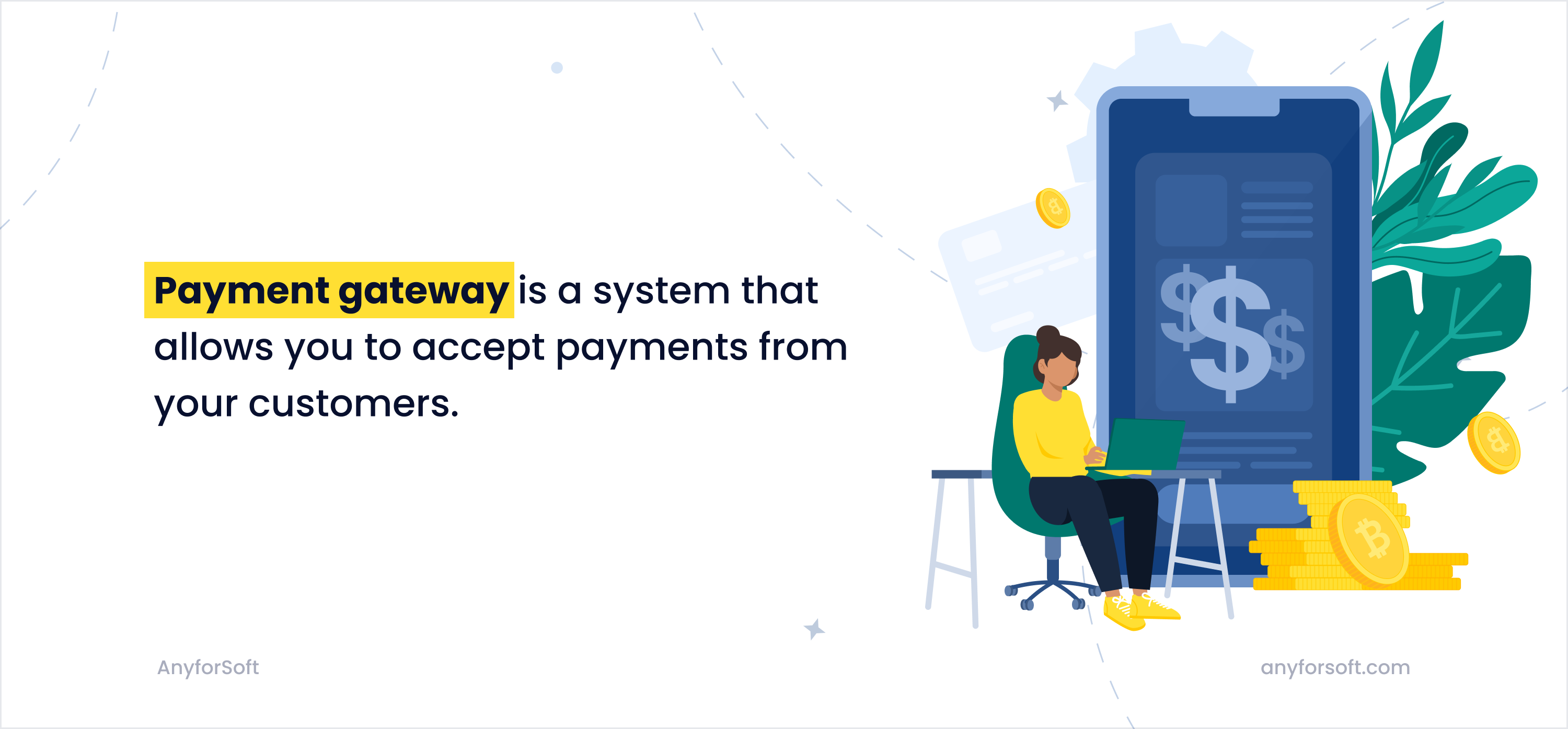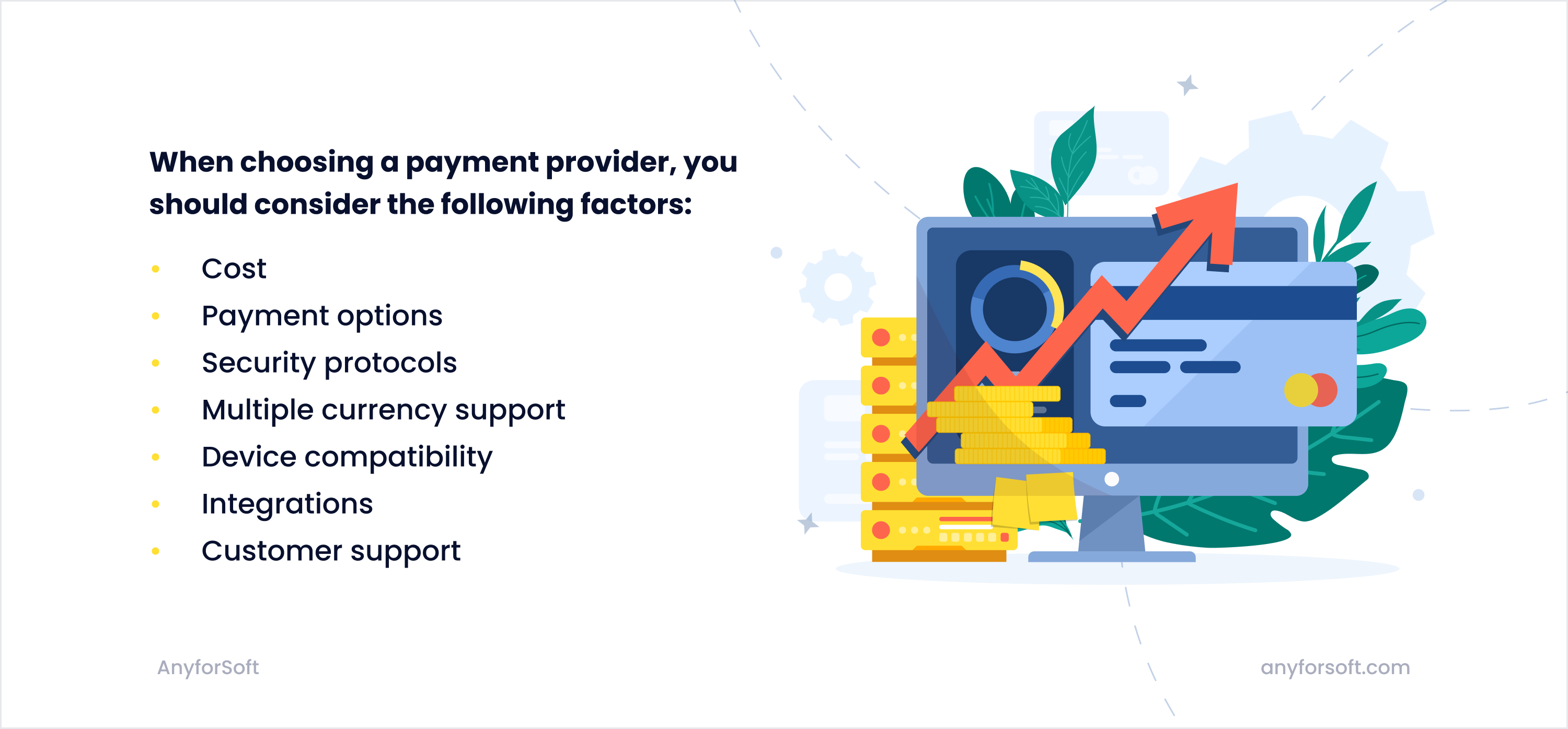Payment systems are an integral part of any online business. To successfully sell your products and services, you should have a robust and secure payment gateway architecture, allowing your customers to purchase with their preferred payment methods. However, building such a system comes with a myriad of challenges:
- You need to store your data securely. In case of disputes, refunds, and financial audits, you should be able to quickly retrieve this data and provide it on demand.
- You need to ensure system reliability. Your payment system architecture should provide 99.99% uptime. Any downtime equals revenue loss.
- Every business that deals with online payments and financial data, must comply with strict regulations. Learn more in our recent article on cybersecurity in fintech.
Considering the above, building a payment gateway architecture may seem intimidating. But don’t worry—it’s not that hard. As an experienced Fintech developer, AnyforSoft would like to elaborate more on this topic and tell you what payment gateways are, how they work, and what factors to consider when choosing payment service providers.
Let’s dive right in!
What is a payment gateway?

In simple terms, a payment gateway is a system through which your customers transfer funds to your company. Modern payment gateways support plenty of payment methods, including debit and credit cards, online banking, recurring payments, digital wallets (PayPal, Stripe, etc.), and even cryptocurrency, allowing customers to make purchases fast and conveniently.
How a payment gateway works
Before we describe how a payment gateway works, let’s make sure you’re familiar with the terminology:
- Acquiring bank—a merchant’s bank used to accept payments and process transactions from customers.
- Issuing bank—the bank that a customer uses for online transactions (in other words, this is the bank that issues credit/debit cards to your client).
- Card schemes—payment networks linked to payment cards, such as debit or credit cards.
- Encryption—the process of converting financial data into encrypted code before sending it to the servers to ensure secure transactions.
- Secure server—a server that follows the Secure Sockets Layer (SSL) protocol and is used for storing financial data.
If that’s clear, let’s move on.
So every transaction on your website goes through these six steps.
Step 1
A customer orders a product/service on your website, making a payment request.
Step 2
The request is sent to a payment gateway for processing.
Step 3
The payment system collects the information required to process the request, including debit or credit card details, transaction details, customer’s first and last name, and so on. This data is then stored on a secure server.
Step 4
Once the required data is collected, the payment gateway encrypts it and sends it to the acquiring bank.
Step 5
The acquiring bank decodes the data and sends the payment details along with an authorization request to the card schemes. The request either gets approved or declined.
If it is approved, the issuing bank processes it once again.
If it is declined, the card schemes notify the acquiring bank that the payment is not approved.
Step 6
The customer gets notified about their successful or unsuccessful payment.
All this payment processing happens within seconds.
Custom payment gateway vs ready-made solution
Designing payment gateway architecture is challenging, so many businesses opt for ready-made solutions from payment providers. However, off-the-shelf tools might not meet your unique business needs and requirements.
So how to solve the custom vs. off-the-shelf software dilemma?
Well, there are multiple factors to consider:
- Price. Payment gateway system architecture development is expensive and requires large upfront investments. Therefore, this option is not for you if you have a startup with a very tight budget. On the other hand, using a ready-made payment platform is more expensive in the long run. You see, off-the-shelf payment gateways charge a small commission (usually from 0.5% to 3%) plus a fixed fee from every sale you make, which entails ongoing expenses.
- Time to market. With custom payment gateways, you have to build every feature from scratch, which naturally takes longer than integrating a ready-made tool. Thus, if time to market is your main concern, integrating an off-the-shelf solution will be wiser.
- Custom features. Ready-made payment gateways are restricted in terms of features. They may not support the features and payment methods that your business requires. Custom development, on the other hand, while being more expensive, gives you more flexibility. You can develop the features you need and add any payment method of your choice.
How to choose the best payment provider

If you've decided that custom payment system architecture is not for you, our next tips will help you choose a good ready-made tool. There are multiple payment processors and payment providers to choose from—the choice should be dictated by the following factors.
Cost
Ready-made online payment gateways charge a certain percentage plus a fixed fee from any sale you make. Some payment platforms also utilize subscription-based and pay-as-you-go models. Make a list of providers, visit their sites, and analyze their pricing options before making a decision.
Payment options
Most vendors that offer payment processing architecture support credit and debit cards (Visa, Mastercard), online banking, and digital wallets. However, many ready-made tools have no support for cryptocurrency. Thus, you should always analyze which payment options a certain provider offers before integrating its tool. Note that there may also be country-specific restrictions: for example, your provider might not support payments from, say, India. This factor also needs to be considered.
Security protocols
Obviously, your vendor should provide robust data security to ensure that your organization’s and your customers’ financial data won’t be compromised. When choosing a payment gateway provider, make sure that it supports the following security measures:
- GDPR
- Multi-layer security
- Firewall and server-side security
- SSL certificate
- DSS compliance
Multiple currency support
If you own an international business, ensure that your payment gateway supports payments in different currencies and from different countries. Your customers should be able to pay in their currency, without huge conversion fees.
Device compatibility
Depending on what product and services you sell, you will have visitors coming to your site from different devices with different platforms. Most payment gateways work smoothly on every device, but some may be buggy on certain platforms. Before investing in a tool, make sure that it works well on devices your target audience will use.
Integrations
A payment gateway is by no means a stand-alone tool. It’s part of an infrastructure that is heavily integrated with other services. Before opting for a solution, you should ensure it supports the platform your site was built on. For instance, if your website was built on Woocommerce, you need to check whether the payment gateway can be smoothly integrated with this CMS. Otherwise, the system will be glitchy and buggy, damaging the user experience and your sales.
Customer support
You may face various issues during or after the integration process. To ensure that you get timely assistance, your provider must have a professional customer support team. Thus, before investing in a tool, communicate with the customer support team and check how fast and professionally it replies.
Conclusion
The payment platform architecture is what makes online transactions possible. Whether you plan to invest in custom payment gateway system design and development or use a ready-made tool, ensure that it provides a smooth payment experience for your customers. Your tool must support multiple payment options and currencies, be fast-responsive, compatible with all platforms, and provide robust data security.
We can help you with this.
AnyforSoft is a customer-oriented company with 12 years of experience that creates solutions of any complexity. Our team will help you integrate an off-the-shelf payment gateway or develop custom software from scratch. We care about our customers’ product vision and build tools with the client’s business needs and requirements in mind.
Contact us today and tell us about your project.
